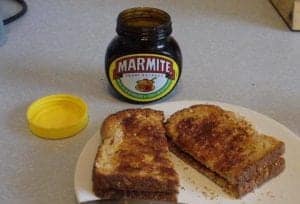Marmite is an iconic, British, dark brown food paste made out of yeast extract. But now researchers believe it may be more than just a tangy spread for toast or biscuits — marmite might also be a potent brain food, according to a study published in the Journal of Psychopharmacology.
Researchers at the University of York in the United Kingdom may have found a link between Marmite and the increase of gamma-Aminobutyric acid (GABA), a neurotransmitter associated with healthy brain function.

The secret to Marmite’s potential brain-boosting power, researchers believe, is due to its high levels of vitamin B12, which is associated with the production of GABA.
“Marmite contains several substances associated with the production of GABA, an important neurotransmitter,” said study author Dr. Daniel Baker from the University of York’s Department of Psychology. “We reasoned that consuming these might increase GABA levels more effectively than consuming GABA itself as this molecule cannot easily pass into the brain from the blood and is likely to be broken down in the digestive system.”
GABA is important to brain health because it acts as an inhibitory neurotransmitter that sends chemical messages through the brain and nervous system while also blocking nerve impulses. By doing so, GABA is able to reduce the excitability of nerve cells and helps maintain a healthy brain.
Related: Blueberry Juice May Increase Brain Function in Older Adults
“This is important for preventing overactive neural responses, which might in extreme cases result in seizures,” Dr. Baker explained.
The researchers recruited 28 healthy volunteers to test their theory. Half of the study’s participants ate a teaspoon of Marmite every day for a month, and the other half ate a teaspoon of peanut butter.
The volunteers were then asked to wear a skullcap outfitted with electrodes, which monitored their brain activity while they looked at a screen with visual stimulus, such as a striped pattern that flickered.
The Marmite group showed a 30 percent decrease in their brain’s response to visual patterns compared to the group that consumed peanut butter.
Related: Ginger Is the Superfood You’re Probably Not Eating Enough
These results are significant because they underline the importance of diet and brain health, the study’s authors explained.
“These results suggest that dietary choices can affect the cortical processes of excitation and inhibition — consistent with increased levels of GABA — that are vital in maintaining a healthy brain,” Anika Smith, a Ph.D. student and first author of the study, said.
The effects of Marmite took about eight weeks to wear off after the participants completed the study, suggesting that diet could possibly have a long-term impact on brain health. However, more research is still needed to determine whether their findings could be used in a medical setting.
Danielle Tarasiuk is a multimedia journalist based in Los Angeles. Her work has been published on AllDay.com, Yahoo! Sports, KCET, and NPR-affiliate stations KPCC and KCRW. She’s a proud Sarah Lawrence College and USC Annenberg alumn.


![How To: ‘Fix’ Crepey Skin [Watch]](https://cdn.vitalupdates.com/wp-content/uploads/2017/05/bhmdad.png)












